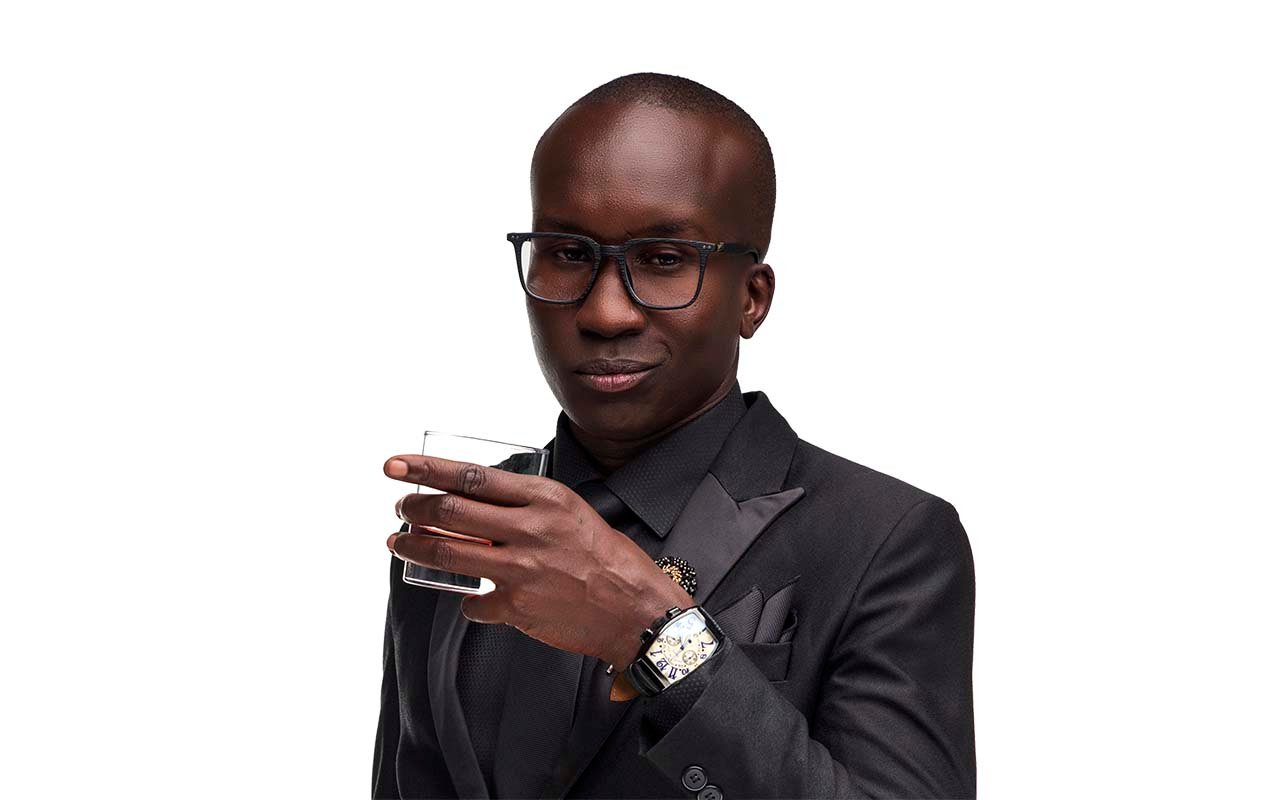
Daniel Omara
Daniel Omara steps onto the stage. He stands stock-still, for the most part, in a casual jacket and jeans. He is calm and ready, like American rapper Eminem in the hit song “Lose yourself.”
Then, in a moment, he starts conversing with the audience. Well, that’s what he calls his stand-up comedy—a conversation.
While other Ugandan comedians have more madness than method to their performances, Omara is a formalist.
He almost never veers far from what he has prepared, rarely improvising any joke unless improvisation was part of his careful preparation to be spontaneous.
His act is a studied array of setups and punch lines. All the moving parts of a joke are still funny, pun unintended, no matter what direction his material takes.
In his execution, he explores the variations on each observation he shares with non-linear logic. His delivery is unhurried, almost as if he wouldn’t mind being somewhere else.
Yet, he is very much in the moment. As a precisian, even his gestures, images, and objects invoked are perfectly preconceived.
That’s because Omara believes in preparation and all the hard graft that comes with it. His steady workmanship calls into question whether humour on the stand-up stage is something that is a product of hard work or divine inspiration.
As to the former, there is indeed a lot that goes into making a joke work.
Heat and humidity
The way a joke may be received by an audience is not always determined by how the joke is told or what the joke consists of.
American comedians Jerry Seinfeld and Eddie Murphy, arguably two of the winningest stand-up comedians of all time, took a stab at explaining this during the hit TV show, Comedians in cars getting coffee.
Jerry Seinfeld: I was just doing some shows in London. And one show I did to warm up to see…
Jerry Seinfeld: So, I go to this club late at night and they have no air-conditioning and it’s London. And it’s hot. It’s hot there for some reason.
Jerry Seinfeld: And comedians know if you go up 1° in temperature in the room, the laughs go down by 20 percent.
Eddie Murphy: Yeah, yes, sure!
Jerry Seinfeld: So, I’m pouring sweat, and I’m thinking, they are not going to laugh, because it’s hot. And that’s the thing you worry about.
As you can see, the room temperature and the humidity have a say, if you please, in how a joke is received by an audience.
That is why it’s important to ensure a natural indoor climate reigns like good weather, as it were.
In Uganda, where a performer has almost no control over such variables, it becomes harder to make people laugh.
It is worse when the audience is subjected to stuffy, poorly ventilated rooms which often serve as venues for comedy shows.
This could be why many people are underwhelmed by comedy performances at Ugandan comedy shows. Still, there is more that goes into translating a joke into rip-roaring laughter.
The work
In a New York Times article, it is revealed how legendary American stand-up comedian Rodney Dangerfield “spent years on them [jokes]; he once told an interviewer that it took him three months to work up six minutes of material for a talk-show appearance.”
This is similar to Sir Winston Churchill saying, “I'm just preparing my impromptu remarks.”
Seinfeld, the only comedian worth over a billion dollars from telling jokes, says he continuously reworks his material in order to make it just right.
"You're always trying to trim everything down to absolute rock, solid rock," says Seinfeld. "I will sit there for 15 minutes to make it one syllable shorter,” he adds.
A good comedian, he says, must go through the rigours that come with finding the right “rhythm of the words, their sound, the delivery and the joke's brevity.”
The motivation to work at one’s act can come from the saddest of places, regrettably.
“I had this great combination of big ego and low self-esteem,” American stand-up comedian Chris Rock says. “And the ego gets you out onstage, but the low self-esteem is the thing that makes you practice so much because you don’t believe in yourself at all. You think you’re a total fucking fraud—and you don’t think anybody could love you for being you, so you have to be good at this thing.”
Yet, in all this, there are comedians who just go on stage and wing it.
In Uganda, we have MC Mariach, for one. He goes on stage and lets rip with a stream-of-consciousness flow that has given him top billing as a stand-up comedian.
This leads us to another form of comedic delivery, one which depends more on comic timing than the Holy Trinity of stand-up: voice, presence and content.
Improvisational comedy
Also known as Improv Comedy, it is a live performance in which stand-up comics make up dialogue on the spot (sometimes incorporating suggestions from the audience).
Timothy Nyanzi’s New Material nights are majorly based on this kind of comedy.
It mostly relies on lightning wit and is extremely difficult to pull off.
But sometimes, it relies on the comedian’s intuition.
“Sometimes, I knew generally what I was going to do, but I've never written anything down. Call it a sixth sense; the lines just come,” said comedian Don Rickles, who was a master of insult comedy.
To give you an idea of how good Rickles was at his craft, celebrities would often beg him to insult them.
On the David Letterman show in 2008, where Rickles and Denzel Washington were guests, Rickles continuously insulted Denzel.
Yet Denzel couldn’t stop laughing and calling him “sir Don Rickles”.
In Uganda, Patrick “Salvado” Idringi is known to have an unerring instinct for telling improvised jokes.
He can just look into the audience and conjure a set out of the expectant faces looking out at him.
In the end, it is the humour that works, regardless of the realities behind it.







